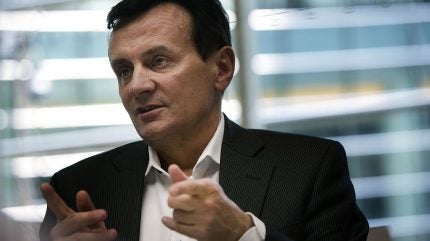
AstraZeneca CEO Pascal Soriot has urged European governments to increase investment in pharmaceutical innovation, warning of a growing imbalance between the US and Europe, which could threaten the region’s long-term competitiveness in life sciences.
Speaking during the company’s Q1 2025 earnings call, Soriot said, “Investment in innovation in pharmaceuticals in Europe has to go up.” He pointed to a decline in Europe’s share of healthcare budgets allocated to innovative medicines, singling out the UK as an example. “That share has been declining steadily over the last number of years, down to 7% of the healthcare budget being allocated to innovative medicines in the UK. What can you do with 7% of your healthcare costs allocated to innovating medicines? Of course, not much.”

Discover B2B Marketing That Performs
Combine business intelligence and editorial excellence to reach engaged professionals across 36 leading media platforms.
Soriot argued that to maintain competitiveness and ensure timely patient access to new therapies, European countries – particularly higher-income ones – must rebalance their healthcare spending.
The comments come amidst increasing concern among European pharmaceutical companies about the region’s ability to attract R&D investment. On 8 April, the European Federation of Pharmaceutical Industries and Associations (EFPIA) warned that the EU risks losing over €100m in planned capital and R&D investments between 2025 and 2029, unless urgent reforms are made to its regulatory and investment environment.
Additionally, the CEOs of Novartis and Sanofi wrote a letter calling on the EU to increase drug prices towards the much higher levels paid by the US, saying it will encourage innovation. The letter, published in the Financial Times on 23 April, said that the European Commission (EC) should set a spending target for medicines and vaccines to “fairly reward innovation”.
Soriot emphasised the broader economic and strategic implications for Europe. “I really think the key piece is that Europe, at least the richer countries in Europe, have to contribute more to pharmaceutical innovation, just like they have to contribute more to their own defence. It’s a relocation of GDP… that would enable a lot of accelerated access, and suddenly a pricing level that would enable [rebalancing] the funding of that innovation between the US and Europe.”

US Tariffs are shifting - will you react or anticipate?
Don’t let policy changes catch you off guard. Stay proactive with real-time data and expert analysis.
By GlobalDataHe added that while tariff-related uncertainties are a short-term concern for the industry, the more critical mid- to long-term issue is the structural gap in innovation funding. “People think it’s a question of price sometimes – no, it’s also a question of delay. In many countries in Europe, patients have to wait two years, three years to get access, which [is] very restrictive.”
AstraZeneca reported $13.6bn in Q1 revenue, a 10% year-on-year increase in constant currencies, driven by strong sales of cancer and biopharmaceutical products. The company reiterated its commitment to expanding in the US, where it currently derives about 40% of its sales. Soriot said AstraZeneca is making “excellent progress” towards its goal of reaching $80m in total revenue by 2030.
“Our company is firmly committed to investing and growing in the US, and we continue to benefit from our broad-based source of revenue and global manufacturing footprint, including eleven production sites in the US… Additionally, we have even greater US investment in manufacturing and R&D planned,” Soriot added in the 29 April statement accompanying the earnings.
Industry-wide, EFPIA has identified €16.5bn in investments considered at risk of relocation from the EU in the next three months alone. The group cited the US’s lead over Europe in investor-critical metrics, including access to capital, intellectual property protection, regulatory speed, and financial rewards for innovation.
Soriot concluded, “I believe, I hope that we [industry] can continue working together to address these two issues,” referring to tariffs and the imbalance between Europe and the US.
Navigate the shifting tariff landscape with real-time data and market-leading analysis.
Request a free demo for GlobalData’s Strategic Intelligence here.




